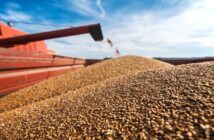The bullish sentiment for the US soy complex has continued, with consecutive sessions of gains for soybeans across all contracts at the start of the week after the USDA report on supply and demand, volatility in the US dollar and question marks around global supply and demand, according to ADM.
The key soy story of the week is extreme weather conditions in Argentina, where key production areas have experienced hot temperatures and dry conditions that look to persist throughout the first half of March.
This will weigh on Argentina’s production, with official production forecasts for maize and soy set to fall. Brazil and the US could well benefit, with record production of soybeans potentially filling the void. The weather looks to have taken its toll in South America with Wednesday’s USDA report trimming Argentina’s production figures from 36.8 million tonnes to 33 million and left Brazil is unchanged at 153 million tonnes. Export estimates for both Brazil and the US were increased due to the shortfall.
Question marks over China
One point that could potentially derail this rally for soy in the long term are question marks around China’s consumption of oilseeds. China announced a rather unambitious 2023 GDP target of 5%, its lowest in decades, with comments from Beijing focusing on economic stability and self-sufficiency. As a key commodity consuming nation this was not positive news and did cause prices to dip, although this looks to be a more long-term development as commodity imports continue this year.
China is the world’s biggest oilseed buyer and has stepped up purchases recently with imports up 16% on the year. Although soybean imports rose, other commodity imports are lagging. Combined with the meagre GDP target, this does call into question China’s long-term pattern of consumption.
European oilseeds fared less well compared to soybeans, with prices on the May down over €30 from last week. Losses extended rapidly towards the end of the week and, with a key downside target of €520 broken, it looks like losses will be sustained for now. Prices are being weighed down by a stronger euro, a fall in the price of alternative oils and a decrease in energy markets across the Continent.
UK prices remain tied to our European counterparts. Whilst a drop in sterling offered some support, it was not enough to offset the losses in Matif rapeseed values, which look set to continue.




